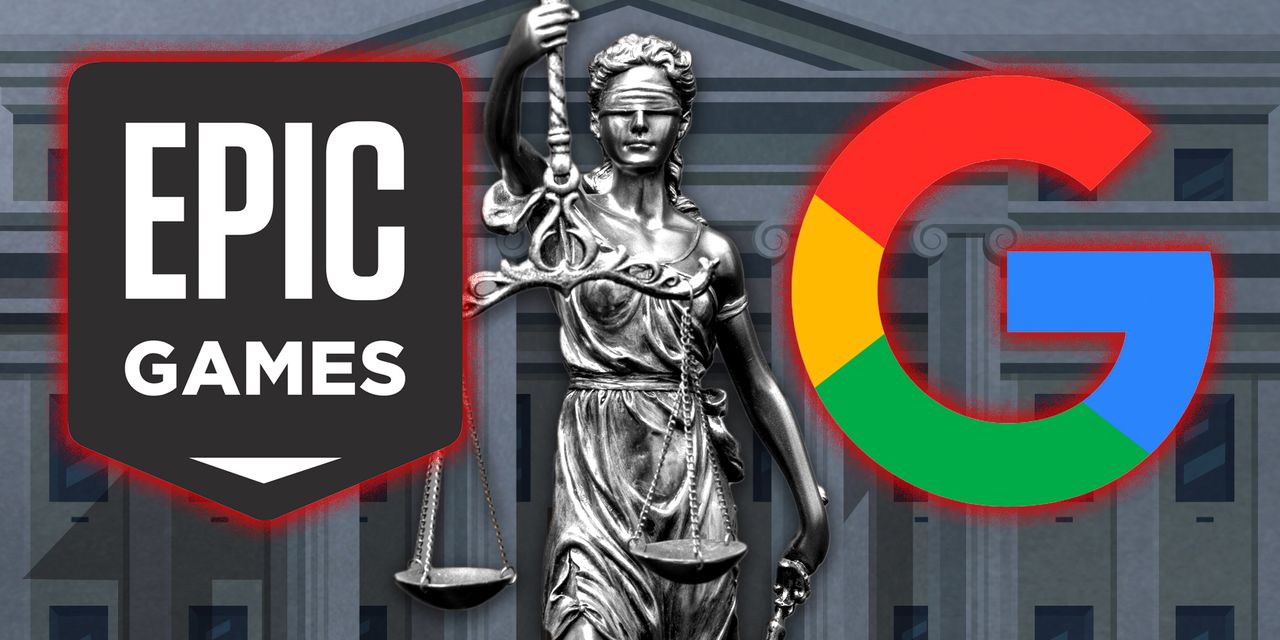Add Epic Games Inc. to Google’s antitrust trial case load.
The maker of the popular videogame “Fortnite,” which battled Apple Inc.
AAPL,
in federal court on similar grounds in 2021, is set to open arguments in a jury trial expected to last several weeks starting Nov. 6 in San Francisco. It claims Alphabet Inc.’s
GOOGL,
GOOG,
Google Play Store restricts competitors from directly distributing their own apps, and instead forces them to have their apps installed via the Play Store.
“We’re fighting for consumer and developer freedom to do business directly, free of monopoly stores, monopoly payment processors and monopoly taxes,” Epic Games Chief Executive Tim Sweeney tweeted.
“In-app transaction prices are inflated by up to 30% by Google fees, versus 3% payment processing fees in competitive markets,” Sweeney added.
The suit — which comes as Google nears the conclusion of its historic antitrust showdown with the Justice Department, which claims the search-engine giant abused its power — does not seek financial compensation, but changes to Google’s practices.
A parade of bold-faced executives dot a witness list of more than 50 people, including Google and Alphabet Chief Executive Sundar Pichai; Google and Alphabet Chief Financial Officer Ruth Porat; Epic CEO Tim Sweeney; and Andy Rubin, one of the co-founders of the Android operating system. Rubin is listed as a “may call” witness, which means it’s possible he won’t take the stand.
Two other Android co-founders, Nick Sears and Rich Miner, could be called by Google. Epic also listed Activision Blizzard Inc. CFO Armin Zerza. Microsoft Corp.
MSFT,
recently completed its $69 billion acquisition of Activision.
Epic’s major beefs are that Google quietly paid game developers hundreds of millions of dollars in incentives to keep their games on the Play Store — and covered up evidence by moving online conversations to Google Chats, where they were destroyed.
Hostilities between the two companies sparked in 2018, when “Fortnite” for Android first launched, and Epic took the unusual step of releasing it exclusively outside the Google Play Store, allowing Epic to bypass Google’s onerous 30% commission fee.
Epic eventually released its popular game on the Play Store in April 2020, until it was removed by Google after Epic added a feature that let consumers sidestep Google’s fee, spurring a flurry of lawsuits.
Epic’s strategy so spooked Google, Epic claims, that the company launched a program called “Project Hug” to ensure other developers would stick with the Play Store.
Project Hug, later called the “Apps and Games Velocity Program,” paid developers hundreds of millions of dollars in incentives to keep their games on the Play Store, according to an unredacted complaint from Epic. By late 2020, Google had signed deals with about two dozen companies, including Activision, which was paid an estimated $360 million, to stay on the Play Store.
Wilson White, vice president of government affairs and public policy at Google, called Epic’s lawsuit “misguided” and “hypocritical.” He said Epic’s claims “seek to undermine” Google’s app store, which he said offers a flexible, secure digital platform for all developers and 2.5 billion users in nearly 200 countries.
“Epic simply wants all the benefits” without paying for what he said is the lowest-fee major app store. Indeed, Epic charges its developers more on its platform, White added.
Wilson posted additional thoughts on the company’s blog.
“Google Play competes with other app stores on Android devices and on rival operating systems for developer attention and business,” a Google spokesman said in a statement. “We’ve long had programs in place that support best-in-class developers with enhanced resources and investments to help them reach more customers across Google Play. These programs are a sign of healthy competition between operating systems and app stores and benefit developers tremendously.”
The DoJ-Google lawsuit
As Epic and Google near their first day in court, a similar case is nearing its conclusion: The Justice Department is taking aim at Google’s dominant search-engine business in Washington, D.C.
The government’s antitrust case has honed in on what Google did to maintain its search and search ads monopolies, and how those allegedly illegal practices harmed consumers and advertisers.
The most egregious tactic is that Google spent billions of dollars to maintain its search-engine monopoly on mobile and web browsers, including $26.3 billion in 2021, according to a DoJ exhibit. Justice Department lawyers said Google paid Apple Inc.
AAPL,
and other tech platforms more than $10 billion a year.
On Monday, Pichai said the intent of his company’s practice of paying Apple and other tech companies to make Google the default search engine was to make the user experience “seamless and easy.”
Match Group Inc.
MTCH,
a former partner of Google, claims Google illegally monopolizes the market for distributing apps by only offering apps that exclusively use its own in-app payment processing product, Google Play Billing, which charges developers up to 30% in commission fees. On Tuesday, Match said it had settled its differences with Google.
Epic’s legal team is closely watching the DoJ trial, but not basing its strategy on it.
As for a previous Epic action against Apple, there are interesting parallels between the two high-profile cases.
“There are similarities with one key difference: Apple is famous for its closed loop and Google has taken steps to pay people,” Abiel Garcia, a former deputy attorney general for California’s Department of Justice, said in an interview. “In some ways, it is a harder argument for Epic to make.”
Epic went to court with Apple in 2020 over the iPhone maker’s stranglehold over the App Store and a commission fee of up to 30% for digital goods and services sold through the App Store.
Apple won nine out of 10 claims in the Epic suit in late 2021. Federal Judge Yvonne Gonzalez Rogers did rule against Apple on its anti-steering policies under the California Unfair Competition Law, and prohibited Apple from barring developers from informing users of other payment systems within apps.
Both companies asked the U.S. Supreme Court to review the ruling. The Supreme Court could decide by the end of the year whether it will take up the case.
For now, the laser focus of Epic is on Google.
“At the most basic level, we’re fighting for the freedom of people who bought smartphones to install apps from sources of their choosing, the freedom for creators of apps to distribute them as they choose, and the freedom of both groups to do business directly,” Epic’s Sweeney said in a tweet, summarizing what is at stake.
Read the full article here







